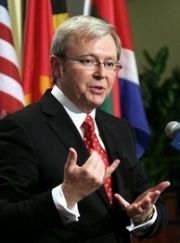Australia accuses Sudan of obstructing peacekeepers in Darfur
March 29, 2008 (UNITED NATIONS) — Australia’s new prime minister on Saturday accused Sudan’s government of obstructing deployment of a U.N.-African Union peacekeeping force to help end the five-year conflict in Darfur.

”And our government is of the view that these matters soon need to be brought back to the U.N. Security Council so that the government of Sudan can be held properly to account for its continued obstruction,” he said.
More than 200,000 have died in Sudan’s Darfur region and 2.5 million have fled to refugee camps since 2003, when local ethnic African rebels took arms against the Arab-dominated central government, accusing it of discrimination. Sudan denies backing the janjaweed militia of Arab nomads accused of the worst atrocities in the conflict.
The Sudanese government has demanded that the 26,000-strong AU-U.N. force for Darfur comprise almost entirely African contingents. While there are Chinese engineers, Khartoum has refused to approve troops from Nepal and Thailand.
Rudd said on Saturday that he had agreed to send nine military officers to assist with preparations for the deployment of the force in Darfur, the same number as Britain and Canada. He also announced that Australia would be providing $4.58 million in humanitarian aid to Darfur.
”The government of Sudan generally has not welcomed any more substantial military commitments than that from Western powers. I regard that as unfortunate, but that is the reality,” Rudd said.
The Australian prime minister flew to New York from Washington, where he met Friday with President Bush. The two leaders played down signs that Rudd has distanced his government from some of the pro-U.S. policies of his immediate predecessor, John Howard.
Bush said he understood Rudd’s decision to withdraw Australia’s combat troops from Iraq and praised Rudd’s commitment to the fight in Afghanistan. The leaders also tried to strike a delicate balance on China, criticizing Beijing’s crackdown on Tibetan protesters without alienating a crucial economic and political partner.
Rudd will visit China before returning to Australia and he was asked whether his criticism Friday of the country’s human rights abuses in Tibet would have an impact.
”I’ve said from day one there are human rights abuses,” he replied. ”I believe the right course of action is for the government of China to exercise restraint.”
”It’s important for the Chinese through their intermediaries to engage with the Dalai Lama and his intermediaries. I think that would be a right and useful way ahead,” Rudd said.
Rudd also announced Saturday that Australia will seek a seat on the U.N. Security Council for 2013-2014 and intends to ”run like fury.”
Australia last served a two-year term on the U.N.’s most powerful body in 1986, he said, and ”I think 30 years is a fair enough old wait between drinks.” He said he expected a difficult race because there are already two candidates for the Western seat – Finland and Luxembourg – and there will likely be more.
(AP)
